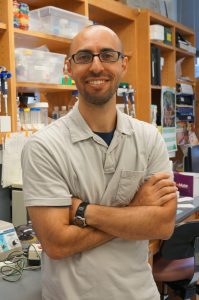
When Dr. Todd Cohen came to UNC in 2014, he was determined to understand what causes our brains to transform when we turn 40 or 50 years old. In just five years, he has built a lab that is paving the way for treatment of debilitating neurodegenerative diseases, most notably Alzheimer’s Disease.
According to the CDC, nearly six million older adults (those 65 and over) in the United States are living with Alzheimer’s. This number is expected to grow to 13.8 million by 2050. Dr. Cohen and his colleagues know that factors like poor diet, smoking and exposure to pollution contribute to the onset of the disease. They also know that those with Alzheimer’s begin to develop the disease decades before symptoms start.
Alzheimer’s is caused by a buildup of plaque and development of tangles in the brain. These tangles kill neurons, leading to neurodegeneration. Dr. Cohen and his team of postdoc fellows and graduate students believe that if they can stop these tangles, they can stop Alzheimer’s. His team members are using the lab environment to “tinker” with brain proteins to produce more or fewer tangles. Once they understand how the tangles form, they can introduce drug therapies that can change the proteins, stopping the progression of Alzheimer’s.
Dr. Cohen and his team are able to leverage the resources and expertise of other UNC departments as they work to better understand the brain. Through UNC Hospitals’ Neurology Clinic, they interact with patients suffering from Alzheimer’s, gathering up-to-date information about the presentation of the disease. The Biomedical Research Imaging Center at Marsico Hall will enable ongoing observation of the disease through state-of-the-art brain scans. Dr. Cohen envisions a time in the not too distant future in which an Alzheimer’s patient receives a drug therapy, returns to UNC to have brain imaging at the Center, and then the clinician is able to see in real time whether the therapy has reduced the plaque and tangles in the patient’s brain.
To make Dr. Cohen’s vision a reality, the lab needs to add to its team of outstanding students and postdocs. It takes over a year to “tinker” with brain proteins and see the effect on the brain. Securing funding to support fellowships is the first step in growing his team—a need that is becoming increasingly urgent as our population ages. Dr. Cohen posits that in 50 years, many of us will be living to 100 years old. He adds, though, that this increased life expectancy means little if it is coupled with living with neurodegenerative diseases.
Fore more information on how to support this research, please contact Aron Johnson, Director of Development – Neurosciences, at aron_johnson@med.unc.edu or 919-843-9902.
